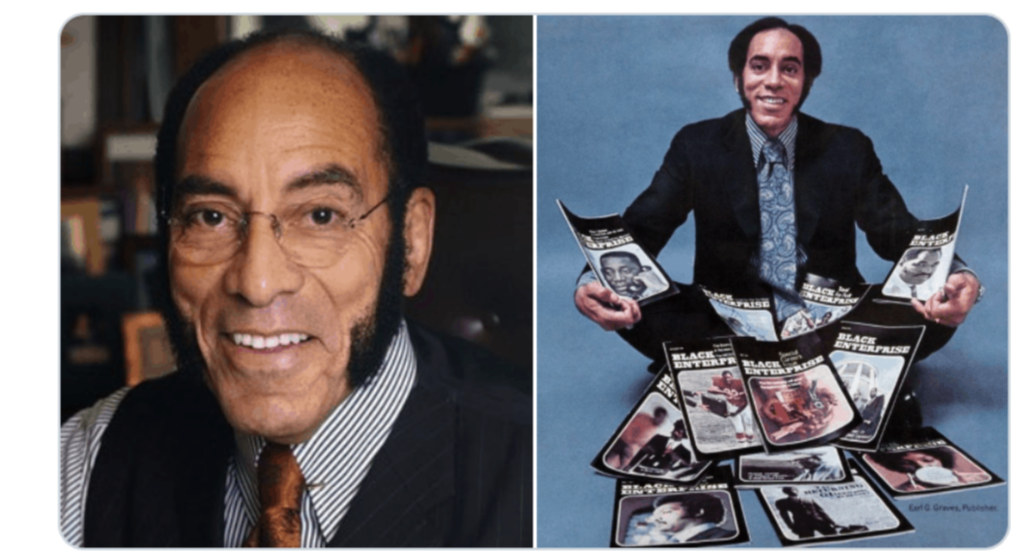(Akiit.com) It is not uncommon to have an unexpected crisis or hardship become the catalyst that guides a person to new opportunities and success. Amid challenging times, the situation may no longer be tolerable or even available as an option, forcing a person to move on to what can potentially be bigger and better opportunities. An unexpected crisis can also cause a person to refocus and tap into previously never-used internal gifts and talents. As a student at Morgan State University, Earl G. Graves Sr. told acquaintances that he hoped to be a successful businessman. They often reacted with skepticism because “the concept of a Black businessman with his own corporation” was largely a foreign, even laughable idea to Blacks as well as Whites.
It proved that as a young man, Graves was a visionary. Serving as an administrative assistant to New York Sen. Robert Kennedy, Graves learned how to cultivate and leverage power in addition to developing political and social skills. The assassination of Robert Kennedy changed everything. Kennedy’s traumatic death in 1968 meant Graves no longer had a job. It propelled him to return to his hometown of Brooklyn, New York, to rediscover his vision and gave birth to the idea of starting a newsletter to publicize advances in the Black community. What began as a newsletter developed into Black Enterprise magazine, which published its first issue in August 1970. “The time was ripe for a magazine devoted to economic development in the African American community,” Graves wrote. “The publication was committed to the task of educating, inspiring, and uplifting its readers. My goal was to show them how to thrive professionally, economically, and as proactive, empowered citizens.” Over the years, the progression continued with Black Enterprise evolving from a single-magazine publishing company to a diversified, multimedia business that reaches more than 6 million African Americans through print, digital, broadcast, and live-event platforms.

One can point to the three years Graves worked for Robert Kennedy as a valuable season of preparation, thereby forming the bedrock of his future leadership philosophy. The greatest investment in leadership is not in things but in people. Earl Graves Sr. was a people person, which became the source of his success. He not only fulfilled his dream of becoming a successful Black businessman, but he also committed himself to help others do the same. The ultimate purpose of leadership in any endeavor—whether it is business, religion, politics, or education—is not the accomplishment of goals or the achievement of quotas but rather the leader’s legacy through his successor. Leadership is concerned more about people than products, more about mankind than money. True leadership is measured by the people you “produce.” Otherwise, after you leave this earth, your vision could leave with you.
Earl Graves Sr. died on April 6, 2020, at 85, after a seven-year battle with Alzheimer’s. Having worked for his father since graduating from Harvard Business School in 1988, his eldest son, Earl “Butch” Graves Jr., was named chief executive officer of Black Enterprise in January 2006. “His concern was the long-term viability of Black Enterprise and making sure that it could be left not just for our generation, but generations to come,” Graves Jr. said about his father. “He understood the importance of that legacy and the importance of an African American-owned business passing from one generation to the next. He was hyper-focused on that.” On April 6, 2022, a public tribute celebrated Earl Graves Sr.’s life and legacy at his beloved Morgan State. Despite being delayed two years due to the pandemic, the tribute touched on every part of his life: dedicated family man, Morgan State alumnus and ambassador, Omega Psi Phi fraternity brother, Army officer, trailblazing entrepreneur, award-winning publisher, business coach, and cheerleader, corporate board pioneer, social justice advocate, philanthropist, political adviser, best-selling author, civil rights leader, and man of faith who cared for people.
Earl Graves Sr.’s commitment to excellence and equality aligns with Frederick Douglass, who said it best in his “Self-Made Men” speech. He stated, “Give the Negro fair play and let him alone. I meant all that I said and a good deal more than some understand by fair play. It is not fair play to start the Negro out in life, from nothing and with nothing, while others start with the advantage of a thousand years behind them. He should be measured, not by heights others have obtained, but from the depths from which he has come…. The nearest approach to justice to the Negro for the past is to do him justice in the present. Throw open to him the doors of the schools, the factories, the workshops, and all mechanical industries. For his own welfare, give him a chance to do whatever he can do well. If he fails, then let him fail! I can, however, assure you that he will not fail.”
Frederick Douglass’s legacy of uplifting people did not die but continued through men like Earl Graves Sr. Earl Graves Sr.’s legacy still lives through his son Butch Graves and millions of others inspired by his leadership. For those committed to hard work and self-determination, the “Self-Made Men” speech applies to every student at the Earl Graves School of Business and Management, every Black entrepreneur, corporate executive, and leader across all professions now and in the future. Rest in peace, Mr. Graves.
Columnist; David W. Marshall
Official website; http://www.davidwmarshallauthor.com









Leave a Reply